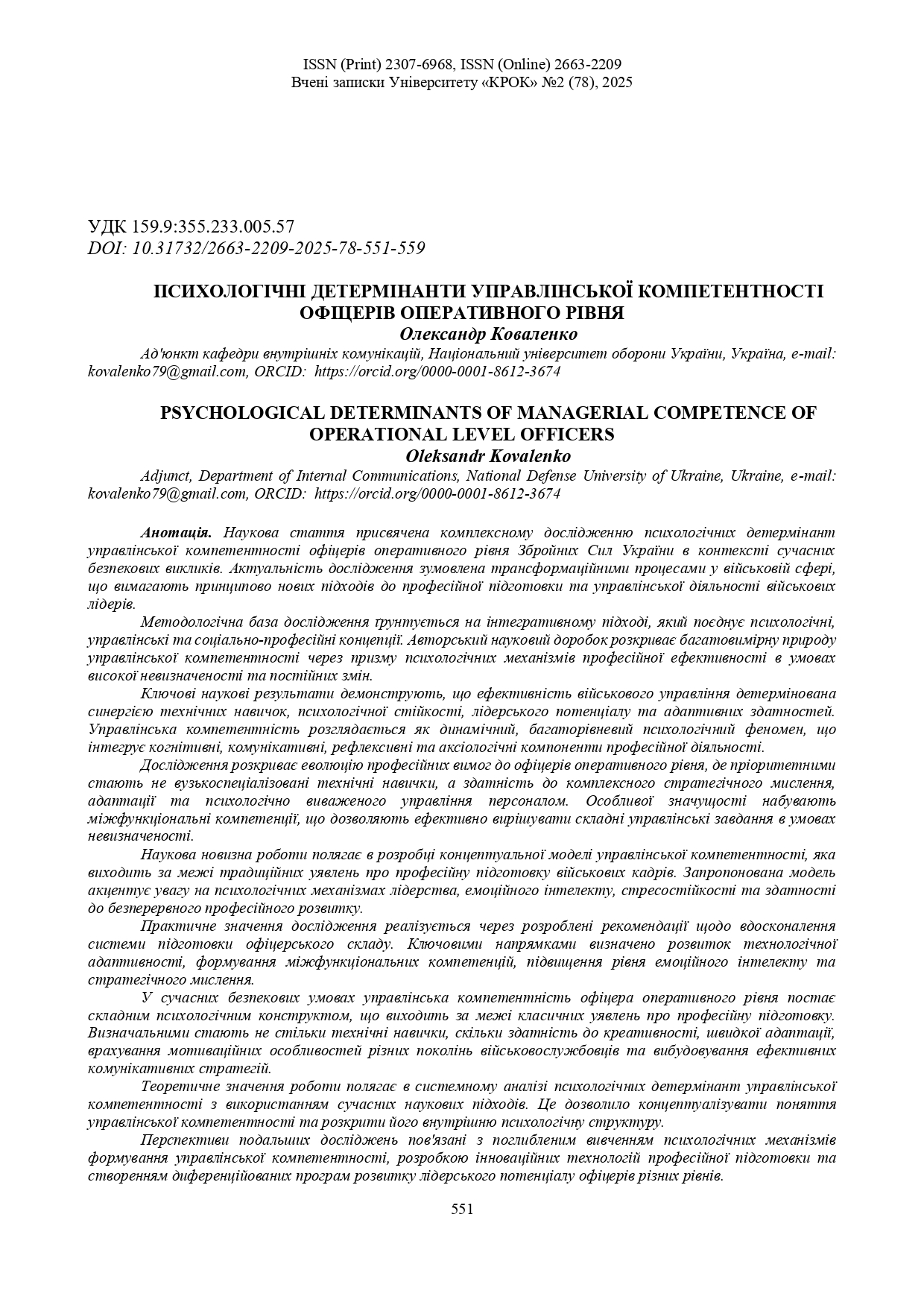ПСИХОЛОГІЧНІ ДЕТЕРМІНАНТИ УПРАВЛІНСЬКОЇ КОМПЕТЕНТНОСТІ ОФІЦЕРІВ ОПЕРАТИВНОГО РІВНЯ
DOI:
https://doi.org/10.31732/2663-2209-2025-78-551-559Ключові слова:
управлінська компетентність, офіцери оперативного рівня, військове лідерство, компетенції, психологічний механізм, адаптивність, воєнний стан, професійна підготовкаАнотація
Наукова стаття присвячена комплексному дослідженню психологічних детермінант управлінської компетентності офіцерів оперативного рівня Збройних Сил України в контексті сучасних безпекових викликів. Актуальність дослідження зумовлена трансформаційними процесами у військовій сфері, що вимагають принципово нових підходів до професійної підготовки та управлінської діяльності військових лідерів.
Методологічна база дослідження ґрунтується на інтегративному підході, який поєднує психологічні, управлінські та соціально-професійні концепції. Авторський науковий доробок розкриває багатовимірну природу управлінської компетентності через призму психологічних механізмів професійної ефективності в умовах високої невизначеності та постійних змін.
Ключові наукові результати демонструють, що ефективність військового управління детермінована синергією технічних навичок, психологічної стійкості, лідерського потенціалу та адаптивних здатностей. Управлінська компетентність розглядається як динамічний, багаторівневий психологічний феномен, що інтегрує когнітивні, комунікативні, рефлексивні та аксіологічні компоненти професійної діяльності.
Дослідження розкриває еволюцію професійних вимог до офіцерів оперативного рівня, де пріоритетними стають не вузькоспеціалізовані технічні навички, а здатність до комплексного стратегічного мислення, адаптації та психологічно виваженого управління персоналом. Особливої значущості набувають міжфункціональні компетенції, що дозволяють ефективно вирішувати складні управлінські завдання в умовах невизначеності.
Наукова новизна роботи полягає в розробці концептуальної моделі управлінської компетентності, яка виходить за межі традиційних уявлень про професійну підготовку військових кадрів. Запропонована модель акцентує увагу на психологічних механізмах лідерства, емоційного інтелекту, стресостійкості та здатності до безперервного професійного розвитку.
Практичне значення дослідження реалізується через розроблені рекомендації щодо вдосконалення системи підготовки офіцерського складу. Ключовими напрямками визначено розвиток технологічної адаптивності, формування міжфункціональних компетенцій, підвищення рівня емоційного інтелекту та стратегічного мислення.
У сучасних безпекових умовах управлінська компетентність офіцера оперативного рівня постає складним психологічним конструктом, що виходить за межі класичних уявлень про професійну підготовку. Визначальними стають не стільки технічні навички, скільки здатність до креативності, швидкої адаптації, врахування мотиваційних особливостей різних поколінь військовослужбовців та вибудовування ефективних комунікативних стратегій.
Теоретичне значення роботи полягає в системному аналізі психологічних детермінант управлінської компетентності з використанням сучасних наукових підходів. Це дозволило концептуалізувати поняття управлінської компетентності та розкрити його внутрішню психологічну структуру.
Перспективи подальших досліджень пов'язані з поглибленим вивченням психологічних механізмів формування управлінської компетентності, розробкою інноваційних технологій професійної підготовки та створенням диференційованих програм розвитку лідерського потенціалу офіцерів різних рівнів.
Наукова робота становить інтерес для психологів, управлінців, дослідників у сфері професійної освіти та військової справи, оскільки пропонує сучасний погляд на проблему підготовки професійних військовослужбовців в умовах високої невизначеності.
Завантаження
Посилання
Борисюк, О. М. (2014). Сутність та структура управлінської компетентності керівника. Проблеми екстремальної та кризової психології, (16), 11–21.
Доктрина розвитку військового лідерства у Збройних Силах України: ОП 1-296. (2024). Київ.
Долженков, О. О., & Черненко, Н. М. (2017). Особистісна готовність керівників до управління ризиками. Наука і освіта, (5), 18–23.
Зінчук, Н. А. (2007). Проблеми розвитку управлінської компетентності менеджерів. Культура народов Причерноморья, 115(1), 50–55.
Коваленко, О. В. (2024). Вплив особистісних характеристик на формування управлінської компетентності у офіцерів оперативного рівня: психологічний аналіз. Перспективи та інновації науки, (3), 861–871. https://doi.org/10.52058/2786-4952-2024-3(37)-861-871
Лідерські компетенції для майбутнього. (n.d.). Retrieved from https://www.management.com.ua/notes/top-leadership-skills-for-the-future.html
Лопушняк, Г. С., & Миляник, Р. В. (2022). Управлінські компетентності керівника: сучасні виклики та детермінанти розвитку. Наукові перспективи, (7), 138–151.
Мо, Гуаньсян. (2023). Управлінська компетентність менеджерів: шляхи формування та тенденції розвитку. Наукові записки кафедри педагогіки, (53), 40–45. https://doi.org/10.26565/2074-8167-2023-53-05
Пінкер, С. (2024). Раціональність (Ю. Костюк & О. Староста, Пер.). Київ: Лабораторія.
Дороніна, М. С. (Ред.). (2019). Розвиток управлінської компетентності керівників підприємств. Харків: ФОП Лібуркіна Л.М.
Хейбер, Дж. (2023). Критичне мислення (О. Бойченко, Пер.). Київ: ArtHuss.
Boyatzis, R. E. (1982). The competent manager: A model for effective performance. John Wiley & Sons.
Dodd-McCue, D. (1990). Managerial Competence: The Key to Excellence: Review. Academy of Management Review, 15(4).
Schroder, H. M. (1989). Managerial Competence: The Key to Excellence. Dubuque, Iowa: Kendall/Hunt.
Szczepańska-Woszczyna, K. (2020). Management theory, innovation, and organisation: A model of managerial competencies. Routledge.

Downloads
Опубліковано
Як цитувати
Номер
Розділ
Ліцензія

Ця робота ліцензується відповідно до Creative Commons Attribution-NonCommercial 4.0 International License.

